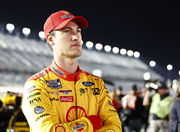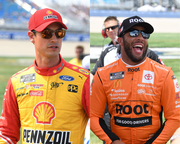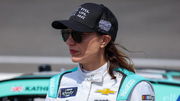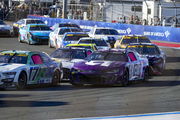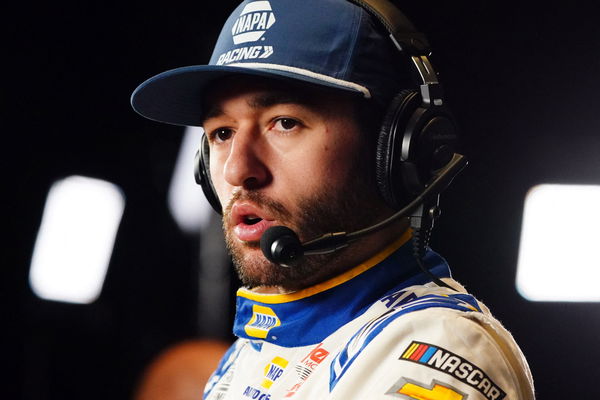
USA Today via Reuters
Feb 14, 2024; Daytona Beach, Florida, USA; NASCAR Cup Series driver Chase Elliott (9) speaks with reporters during media day at Daytona International Speedway. Mandatory Credit: John David Mercer-USA TODAY Sports

USA Today via Reuters
Feb 14, 2024; Daytona Beach, Florida, USA; NASCAR Cup Series driver Chase Elliott (9) speaks with reporters during media day at Daytona International Speedway. Mandatory Credit: John David Mercer-USA TODAY Sports
With Bristol Motor Speedway’s tire management battle triggering a mighty debate between drivers, insiders, and fans alike, there has been overwhelming support for NASCAR to continue with such short-track races. However, some drivers have also spoken out against the uncertainty brought by the tire package, with William Byron amongst the most vocal about how it could be ‘unfair’ to drivers in the playoffs. While the #24 driver feels the sport needs to help teams understand what to expect, his teammates seem to have vastly contrasting opinions. Sidelining the #24 garage’s woes, Chase Elliott gave a harsh reality check to those brandishing doubts over the Goodyear tire package and its implementation in the future.
HMS teammates agree to disagree
Although Byron felt that the lack of communication and insight into what made the tires wear ended up costing drivers solid finishes, Chase Elliott believes no one but the drivers and teams are to blame for not coming prepared for such changes. After all, adaptability is perhaps one of the biggest factors that makes a racer successful in the long run.
ADVERTISEMENT
Article continues below this ad
Speaking to Bob Pockrass, Elliott highlighted the doubts some drivers are exhibiting. He stated. “Look in the mirror, you did it to yourself, is kind of how I look at it. As long as you know it’s coming, I think that the big thing is that you need to know what you have to work with. Going back, I think if we know that’s going to be the environment we go back in, then I think we adjust to it.”
Elliott felt some drivers weren’t realizing they would now have more control over the failure of a tire, knowing that it was possible to keep it in foresight. He shared, “When the tire is actually wearing, you don’t have these catastrophic blowouts, right? Typically, you’re running long, you don’t know something’s gonna happen, and next thing you know, a tire fails, and you pound on the wall and the day is over.”
I wonder if a similar tire-management Bristol race that is a playoff cutoff race is a good idea or whether fans would be angry if their driver has a tire failure that eliminates them from contention. While at Hendrick Motorsports today, I got the view of their drivers. pic.twitter.com/pIIo1Rl4Nf
— Bob Pockrass (@bobpockrass) March 19, 2024
But with Bristol, the tire showcased wearing characteristics naturally, making a driver aware of exactly when it would fall off the edge of the grip. He added, “You could feel when you got to the chords, you knew you had a problem, so you had a chance to drive your car differently on the front end and then you also had a chance to kind of know the warning signs that were screaming at you. That, I think, is a really good thing to know instead of the tire just popping and being over with.”
READ MORE: Kevin Harvick Snubs Denny Hamlin’s Short-Track Demands, “We Don’t Need Any Freaking Horsepower”
And Elliott wasn’t the only HMS driver who seemed to have a different opinion to William Byron. Alex Bowman also chimed in to share that the driver had more control with the high degradation setup.
ADVERTISEMENT
Article continues below this ad
Trending
Alex Bowman sides with Chase Elliott on Goodyear tire debacle
Taking a page out of Elliott’s book, Alex Bowman also felt that if a driver messed up at Bristol with this package, it would be down to their negligence. Compared to a normal weekend where the race would either be decided by the car’s pace or fuel mileage, the tire management added a layer of strategy that separated the good from the grear. Reflecting on this, Bowman said he believes that the short-track package with the Goodyear tire will give the driver more control over a race’s outcome.
Bowman shared with Pockrass, “A normal Bristol race, where you run 500 laps wide open as hard as you can. Like, if your car’s good, you’re good, if your car’s not good, you struggle. If you have perfect pit stops, it is great. If you have one bad pit stop, it’s almost impossible to pass your way back up through there. So having that in your hands as a racecar driver and being able to make the right decisions, on how you save your tires and when you push and what you’re feeling is something that I think I enjoy, so I’m all good with it. I think there are some mixed feelings about it, but I don’t mind it at all.“
ADVERTISEMENT
Article continues below this ad
READ MORE: Concrete Bristol Shatters Own Record Amidst NASCAR’s Triumphant Tire-Management Return
After taking a look at the contrasting opinions within the Hendrick Motorsports camp about NASCAR and Goodyear’s decisions, do you think short-track racing is heading in the right direction?
ADVERTISEMENT
ADVERTISEMENT
ADVERTISEMENT
ADVERTISEMENT


